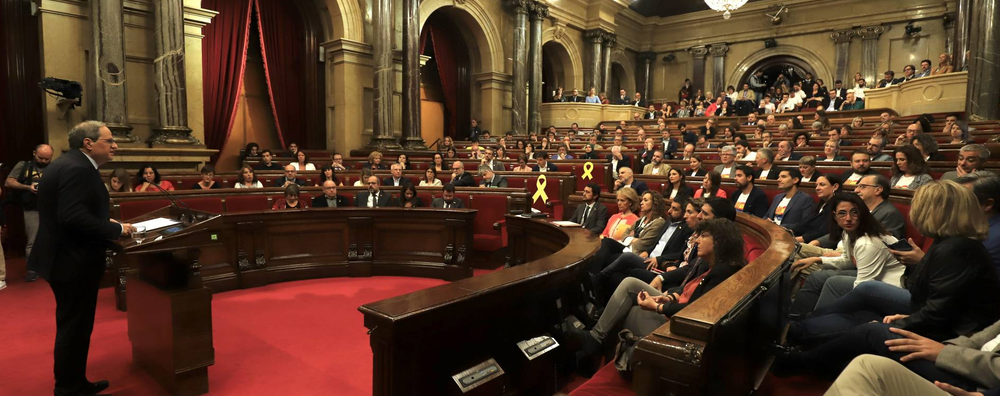- The head of the government appeared before a plenary session of Parliament to set out the planned response to the 1 October referendum trial
- Torra condemned incidents of violence, which he said do not represent the independence movement, and called for calm and civic responsibility
- He also called on the Spanish government to “address the conflict the way democrats do: by talking and giving voice to citizens”
- Torra expressed support for the Catalan police force and demanded accountability and compliance with guidelines for police action

This morning, in a plenary session of Parliament, the president of the Government of Catalonia, Quim Torra, gave his response to the ruling in the 1 October referendum trial, which he described as a “disgrace”. The head of the government argued that “we must continue to move forward and not allow ourselves to be intimidated by threats and prohibitions”. He also said he would seek to exercise Catalonia’s right to self-determination again before the end of this legislature. “That’s my proposal for a nation that never goes away and never ceases to demonstrate its determination and steadfastness.” Torra concluded: “We cannot fail the people, who, these days and always. have demonstrated their commitment to freedom, justice and democracy.”
The head of the executive, who appeared before Parliament at his own request, said his proposed response to the Supreme Court ruling would be articulated through an international channel and two specific tools.
With respect to the former, Torra said: “The Council for the Republic, headed by President Carles Puigdemont, is an extremely valuable body.”
The president also gave details of other initiatives, including letters being sent to the presidents and prime ministers of EU, G20 and EFTA countries and contacts with international leaders being made by the Minister for Foreign Action, Alfred Bosch. “We will continue to internationally disseminate the opinions of the UN Working Group on Arbitrary Detention, which call for the immediate release of the Catalan political prisoners.”
As for the response within Catalonia, the president focused on two tools and one “engine” that would underpin initiatives in the coming months. “The engine we need is a budget for 2020 to drive social change, with an additional €2.5 billion that will enable us to pursue an ambitious crash programme to support those who most need help. We need a budget to move forward and help everyone move forward.”
The first tool the president discussed is a project that involves a process of discussion and debate to develop a Catalan constitution. Torra said the project, headed by Lluís Llach, has a “very high level of participation” and that a proposal should be ready by the spring.
The second tool he focused on is the “National Agreement”, adopted by an absolute majority of the House, for “self-determination, civil and political rights, and an amnesty”. The president said the agreement should be pursued and developed to “bring together all the pro-democracy forces with the aim of establishing the consensus necessary to secure an amnesty for everyone being prosecuted for exercising their political, civil and social rights [and] define concrete ways to exercise our right to self-determination as soon as possible”. Torra concluded: “In this legislature, if all of the parties and organisations work together to make it possible, we should be able to validate Catalonia’s independence.”
The president said Catalonia “cannot afford to take a step backwards in the defence of its inalienable right to self-determination”. He appealed to all Catalan MPs to “react against this violation of freedom of expression, parliamentary inviolability, and our right as a people to decide our own future”.
“We will not be defeated by fear, threats or bans from public office. When it comes to our right to self-determination, it is Catalonia’s dignity that is at stake.”
President Torra said that apart from convicting Catalan political and social leaders, the Supreme Court ruling condemns “democracy and more than two million people who participated in that referendum”.
Rejection of violence and support for Catalan regional police
The head of the executive said: “No one should seek to criminalise non-violent civil disobedience, because it’s a legitimate way to defend rights that have been denied.” He argued that the Supreme Court ruling is “a direct attack on the exercise of people’s fundamental rights and the most serious blow to democracy since 1978”.
The president again called for people to act calmly and with a sense of civic responsibility, insisting that violence is not the language of the independence movement. “We reject violence as we always have. It does not represent us. We reject and condemn all violence, whoever it’s perpetrated by and whatever justification is claimed.” The president warned: “If there are provocateurs and agitators who want to change the course of peaceful mobilisations, they must be isolated.” He also said it was important to thoroughly investigate who is behind incidents of violence.
The president also expressed support for the Mossos d’Esquadra (Catalan police force), but said they should carry out their duties in a “scrupulous and exemplary way”, in line with established protocols. Torra said he had asked Minister Buch to investigate any irregular situations that may have occurred in recent days in order to ensure accountability and compliance with legal guidelines for police action.
Call for dialogue
The president also called on Spain’s caretaker prime minister to “address the conflict the way democrats do: by talking and giving voice to citizens [because] neither the unity of Spain nor the independence of Catalonia can serve as an excuse for violating the rights of people or their political representatives”.
